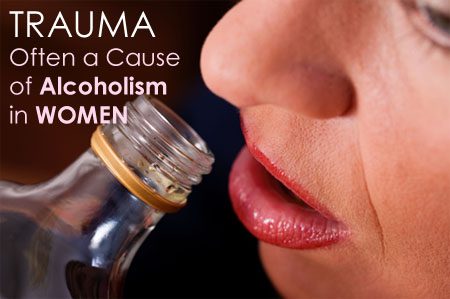Trauma Often a Cause of Alcoholism in Women
Studies have shown that more women than ever are drinking alcohol — according to one survey, almost half of all women are considered “current” drinkers, meaning that they have had a drink at some time in the last 30 days.

In general, light to moderate drinking, defined as fewer than seven drinks in a week, isn’t especially harmful to the average woman. However, drinking more than that amount has the potential to turn into a serious drinking problem, especially when combined with other mental health issues. Women in general have a greater risk of becoming addicted to alcohol than men, and when combined with the stress caused by trauma, that risk only increases. In fact, a high percentage of women who seek treatment for alcoholism experienced some type of trauma, leading many experts to believe that there is a correlation between the two.
PTSD and Drinking
In 2011, a landmark study from Columbia University revealed that many female alcoholics also suffer from Post-Traumatic Stress Disorder (PTSD), usually triggered by interpersonal violence. In short, the study suggested, women with PTSD often turn to alcohol as a means to deal with the physical and emotional pain.
Other studies have also connected a history of sexual and physical abuse with alcoholism in women. Scientists at Harvard University point out that women who have a family history of alcohol abuse, who were abused as children or who were abused as adults have a greater risk of alcohol dependency than those women who do not experience such trauma. Again, alcohol becomes a form of self-medication, as women drink to deal with the depression, anxiety, shame, stress and other problems created by that trauma.
Barriers to Treatment
Unfortunately, while women are more likely to become alcoholics, they are less likely to seek treatment for their drinking problems — and when they do seek treatment,they need a specialized program to meet their specific emotional needs in order to be effective.
In general, women are less likely to label themselves as alcoholics than men are, most likely because while drinking has become more socially acceptable, there is still a somewhat of a stigma associated with being a female alcoholic. In many cases, women are more likely to describe their problems in emotional terms, chalking up their drinking to a symptom of anxiety or depression, and something they can easily curtail.
Women are also less likely to seek treatment because of family and economic factors. Despite the effects that their drinking can have on family members, particularly children, women are often reluctant to leave their children for several weeks or months to receive treatment, especially if they fear that they will lose custody as a result of seeking help. Economic factors also play a role. A significant percentage of women with drinking problems are also single parents and simply do not have the resources necessary to pay for their treatment.
The Importance of Gender-Specific Treatment
Some researchers also note that a lack of gender-specific treatment programs is a major barrier to women getting help for their drinking problems. Women who have experienced trauma at the hands of a man may feel uncomfortable in a mixed-gender program, while even those women who do not have such trauma may feel uncomfortable in such a situation.
That is why women-only treatment programs are reporting higher than average success rates in helping their patients get and stay sober. Not only do women feel more comfortable among other women, such programs are often better equipped to manage the unique emotional needs of women. For example, the Columbia University study found that female alcoholics who experienced trauma have a higher success rate in overcoming their drinking problems when they combined therapy to deal with the trauma with treatment for their drinking, including 12 step programs. Medication to help manage anxiety and depressions has also been shown to help reduce drinking among women.
In the past, it was simply accepted that women were not as capable as men of recovering from alcoholism. However, research since the 1990s has proven that women are just as capable of recovery, but they have unique needs and barriers to treatment. By exploring the underlying issues related to the drinking, and treating them in addition to the addiction, women who drink too much can get healthy and sober, and regain control over their lives.



